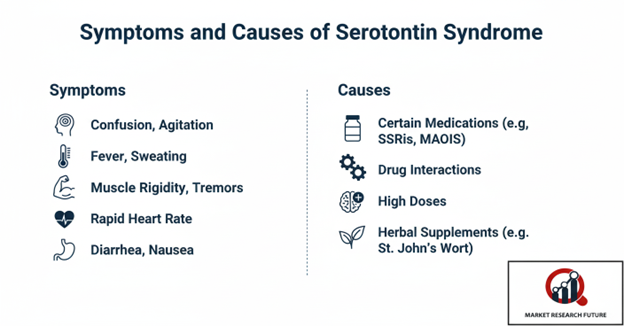Symptoms and Causes of Serotonin Syndrome

Serotonin Syndrome Market Overview
Serotonin syndrome is a potentially serious medical condition caused by an excess of serotonin—a key neurotransmitter responsible for regulating mood, digestion, sleep, and other vital functions—in the central nervous system. This imbalance typically results from the use or combination of certain medications that elevate serotonin levels beyond the body’s ability to manage.
While serotonin plays a crucial role in facilitating communication between brain cells and other nerve cells, excessive accumulation can lead to overstimulation of the nervous system. This, in turn, may cause symptoms ranging from mild restlessness to severe muscle rigidity and life-threatening complications. Understanding the signs, causes, and treatments of serotonin syndrome is essential for timely diagnosis and prevention.
Symptoms of Serotonin Syndrome
The severity of serotonin syndrome can vary depending on the amount of serotonin in the body. Symptoms generally appear within hours of taking a new medication, increasing a dosage, or combining certain drugs.
Common symptoms include:
- Rapid heart rate and palpitations
- Headaches
- Dilated pupils
- Muscle twitching or rigidity
- Shivering and goosebumps
- Restlessness or agitation
- Loss of muscle coordination
- Confusion or disorientation
- High blood pressure
- Heavy sweating
- Nausea or diarrhea
In mild cases, these symptoms may resolve once the triggering medication is discontinued. However, severe serotonin syndrome can cause:
- Unconsciousness
- Seizures
- Irregular heartbeat
- High fever (hyperthermia)
These symptoms can be life-threatening, and patients experiencing them should seek immediate emergency medical care.
Causes of Serotonin Syndrome
Serotonin syndrome most often occurs when two or more medications that influence serotonin levels are taken together. However, in certain cases, even a single drug can trigger the condition in sensitive individuals.
For instance, combining antidepressants with opioid painkillers or migraine medications can significantly increase serotonin activity in the brain.
Medications commonly associated with serotonin syndrome include:
- Selective Serotonin Reuptake Inhibitors (SSRIs): fluoxetine (Prozac), sertraline (Zoloft), citalopram (Celexa), paroxetine (Paxil)
- Serotonin and Norepinephrine Reuptake Inhibitors (SNRIs): venlafaxine (Effexor), duloxetine (Cymbalta), trazodone
- Tricyclic Antidepressants: amitriptyline, nortriptyline (Pamelor)
- Opioid Medications: codeine, fentanyl, tramadol, oxycodone, hydrocodone, meperidine
- Anti-Migraine Medications: triptans and ergot derivatives
- Anti-Nausea Drugs
- Herbal Supplements: St. John’s Wort, ginseng, nutmeg
- Lithium
- Cough and Cold Medications containing dextromethorphan
- Recreational Drugs: LSD, cocaine, ecstasy (MDMA), and amphetamines
Cannabinoids have also been shown to influence serotonin levels, although the extent of their impact is still under clinical investigation.
Duration and Recovery
The duration of serotonin syndrome depends largely on the type of medication involved and the individual’s metabolism.
In mild cases, symptoms often subside within 24 hours of stopping the offending drug. However, some antidepressants with longer half-lives may prolong serotonin elevation, causing symptoms to persist for several days or even weeks.
Continuous medical monitoring is essential until serotonin levels stabilize, particularly for patients with pre-existing conditions or polypharmacy (use of multiple medications).
Treatment and Management
The treatment of serotonin syndrome depends on its severity:
- Discontinuation of the Triggering Medication: The first step involves stopping all serotonergic drugs under medical supervision.
- Supportive Care: Patients with high body temperature may require external cooling measures to prevent hyperthermia.
- Blood Pressure Regulation: Short-acting medications are used to stabilize sudden fluctuations in blood pressure.
- Sedation and Symptom Relief: In severe cases, benzodiazepines may be administered to control agitation, seizures, or muscle stiffness.
Early recognition and intervention are vital to prevent complications and ensure full recovery. Most patients recover completely once serotonin levels return to normal.
Conclusion
Serotonin syndrome highlights the delicate balance required when managing multiple medications that affect brain chemistry. While serotonin is vital for emotional well-being and cognitive function, excessive levels can pose serious health risks.
Patients should never combine or adjust serotonin-related medications without consulting a healthcare professional. Immediate medical attention should be sought at the first sign of symptoms such as high fever, irregular heartbeat, or muscle rigidity.
Through greater awareness, careful prescription management, and timely treatment, serotonin syndrome can be effectively prevented and managed.

Leave a Comment